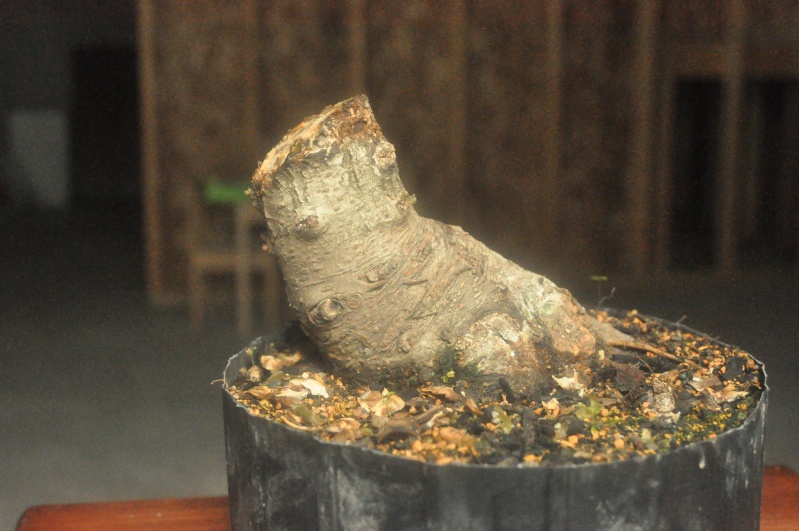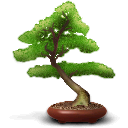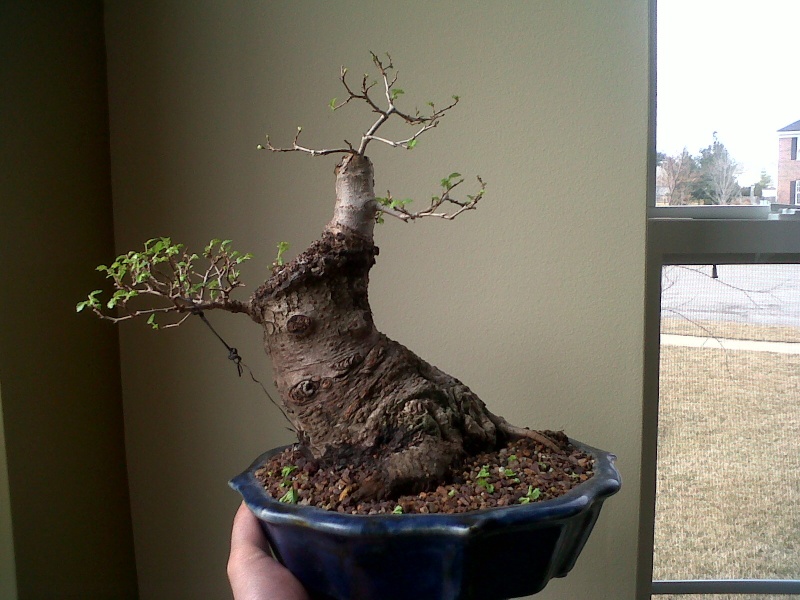Siberian Elm Trunk Chop training
+8
Sam Ogranaja
moyogijohn
drgonzo
Rui Marques
manosvince
coh
LSBonsai
Rob Kempinski
12 posters
Page 1 of 2
Page 1 of 2 • 1, 2 
 Siberian Elm Trunk Chop training
Siberian Elm Trunk Chop training
Here is a material that is excellent for learning, and practicing bonsai techniques. It is invasive in my area, so it is practically free. The leaves easily reduce to a 1/4inch by constant pinching, it is a very vigourous grower... so wounds heal nicely, the bark plates similar to an old Hawthorn but at a much younger age, responds extremely well to pruning and root-pruning.
I practiced trunk chop twice from a 15 foot tree. I did it twice because when I repotted the tree (after removing the old soil), I discovered a very attractive bulge at the base. The surface roots are still very poor, so this spring I might tie a wire under the base to encourage roots fanning out.
The winter after first trunk chop. It looked like a decent tree then.

Here is the second trunk chop:

Here is some growth after the second chop. I am trying to get a basic structure before I grow a sacrifice leader.

And here it is now. The sacrifice leader is almost 7 feet tall.

The rate at which this tree grows, I think the foliage should fill in nicely by next year.
- S
I practiced trunk chop twice from a 15 foot tree. I did it twice because when I repotted the tree (after removing the old soil), I discovered a very attractive bulge at the base. The surface roots are still very poor, so this spring I might tie a wire under the base to encourage roots fanning out.
The winter after first trunk chop. It looked like a decent tree then.

Here is the second trunk chop:

Here is some growth after the second chop. I am trying to get a basic structure before I grow a sacrifice leader.

And here it is now. The sacrifice leader is almost 7 feet tall.

The rate at which this tree grows, I think the foliage should fill in nicely by next year.
- S
Guest- Guest
 Re: Siberian Elm Trunk Chop training
Re: Siberian Elm Trunk Chop training
Good development. Where will the next chop be? At the first branch or second?

Rob Kempinski- Member
 Re: Siberian Elm Trunk Chop training
Re: Siberian Elm Trunk Chop training
Thanks Rob. The next chop will remove the sacrifice at the point you see the small future leader growing. Ofcourse I would have to grow another sacrifice to smooth the taper along the trunk line.
I am not planning to do the next trunk chop until I get a smooth taper from the first chop. I am anticipating this to be next winter.
- S
I am not planning to do the next trunk chop until I get a smooth taper from the first chop. I am anticipating this to be next winter.
- S
Guest- Guest
 Re: Siberian Elm Trunk Chop training
Re: Siberian Elm Trunk Chop training
suburbia wrote:Here is a material that is excellent for learning, and practicing bonsai techniques. It is invasive in my area, so it is practically free. The leaves easily reduce to a 1/4inch by constant pinching, it is a very vigourous grower... so wounds heal nicely, the bark plates similar to an old Hawthorn but at a much younger age, responds extremely well to pruning and root-pruning.
I practiced trunk chop twice from a 15 foot tree. I did it twice because when I repotted the tree (after removing the old soil), I discovered a very attractive bulge at the base. The surface roots are still very poor, so this spring I might tie a wire under the base to encourage roots fanning out.
The winter after first trunk chop. It looked like a decent tree then.
Here is the second trunk chop:
Here is some growth after the second chop. I am trying to get a basic structure before I grow a sacrifice leader.
And here it is now. The sacrifice leader is almost 7 feet tall.
The rate at which this tree grows, I think the foliage should fill in nicely by next year.
- S
I like your vision for a stout little shohin, but I hope you don't mind if I make a suggestion for future projects. When growing out a new leader after a trunk chop, I would wire it while it is still young, before it thickens considerably. It seems with your tree that you just let it grow straight up. I think the ideal movement for the new section should be somewhat forward and to the right (the tree's left). Even though you will be chopping off most of the new leader soon, you will still be left with a part that goes straight up, and may not be in agreement with the dynamic base.
Another comment is about the long-term stability of Siberian elm as bonsai. I am not sure if you are aware of this, but they have a bad reputation for dropping branches for no reason (likely due to their nature as a pioneer species). I am always interested in hearing about others' experience with the speciies, because I dug up a very old hedge of ulmus pumila last spring, and am hoping to find a way to keep some of them as bonsai over the long term (I attached a pic of one of the nicer pieces of material I got from the hedge). You made it clear that this is a practice tree for you, so I am not sure if this stability issue concerns you.
I am currently testing the idea that annual repotting may improve the stability of the species, my reasoning being that it will always keep the tree in a state of vigour. This could present problems in the long run, however, when it comes to the 'mature' stage of bonsai.
Thanks for sharing

LSBonsai- Member
 Re: Siberian Elm Trunk Chop training
Re: Siberian Elm Trunk Chop training
Very nice tree Khalid. I like the movement on your trunk.
Thanks for your suggestion, and I completely agree that it is easier to shape a tree when the stem is young. I actually did consider doing that earlier, but then I thought that the trunk needs to thicken a lot to smoothen the taper and that along with the new leader will create enough movement that is consistent to the whole tree.
I have also heard that Siberian Elm has a tendency to lose the lower branches... we will see how this tree reacts. Maybe if I can maintain a good flow of energy in the lower branches by pruning/pinching, I should be good. I still think that this is a good learning material before jumping onto trees like Zelkova, Hornbeam, etc. I'd rather learn from my mistakes on cheaper material than expensive.
Thanks,
- S
Thanks for your suggestion, and I completely agree that it is easier to shape a tree when the stem is young. I actually did consider doing that earlier, but then I thought that the trunk needs to thicken a lot to smoothen the taper and that along with the new leader will create enough movement that is consistent to the whole tree.
I have also heard that Siberian Elm has a tendency to lose the lower branches... we will see how this tree reacts. Maybe if I can maintain a good flow of energy in the lower branches by pruning/pinching, I should be good. I still think that this is a good learning material before jumping onto trees like Zelkova, Hornbeam, etc. I'd rather learn from my mistakes on cheaper material than expensive.
Thanks,
- S
Guest- Guest
 Re: Siberian Elm Trunk Chop training
Re: Siberian Elm Trunk Chop training
Thanks for posting these, I'm looking forward to seeing the evolution. I've got some trees that I'm planning to chop soon (probably in the spring) so it's helpful to see the process. What is the approximate trunk diameter just below that chop?
Chris
Chris

coh- Member
 Re: Siberian Elm Trunk Chop training
Re: Siberian Elm Trunk Chop training
The base is around 7 inches. In addition to knowing when and how to chop, I would recommend reading Brent Walston's article on Trunk Development. Some of my experiments are based off his articles.
http://www.evergreengardenworks.com/trunks.htm
- S
http://www.evergreengardenworks.com/trunks.htm
- S
Guest- Guest
 Re: Siberian Elm Trunk Chop training
Re: Siberian Elm Trunk Chop training
After the second chop, how many years did you left the tree to grow free ?

manosvince- Member
 Re: Siberian Elm Trunk Chop training
Re: Siberian Elm Trunk Chop training
The second chop was done this past March 2011. Note, I did not let the tree grow free... I only let the sacrifice grow free. I still wanted to work on basic branch structure and tree shape.
Some people that I have spoken to suggest to grow the trunk first, then develop the branches. But in this project I am observing that you can do both things at the same time (provided your tree grows vigorously); this way I can save time with tree development.
- S
Some people that I have spoken to suggest to grow the trunk first, then develop the branches. But in this project I am observing that you can do both things at the same time (provided your tree grows vigorously); this way I can save time with tree development.
- S
Guest- Guest
 Re: Siberian Elm Trunk Chop training
Re: Siberian Elm Trunk Chop training
I suggest to do these two combined 
And the first chop ? When did you did it ?
And the first chop ? When did you did it ?

manosvince- Member
 Re: Siberian Elm Trunk Chop training
Re: Siberian Elm Trunk Chop training
Within one year it grow up 7 feet ?? ->> https://servimg.com/view/15280121/76

manosvince- Member
 Re: Siberian Elm Trunk Chop training
Re: Siberian Elm Trunk Chop training
That is what I said. This is a very fast growing tree even for Chicago weather. Actually this summer was/is unusually hot... maybe that contributed towards the rapid growth along with heavy fertilizing, large pot and loose soil.
- S
- S
Guest- Guest
 Re: Siberian Elm Trunk Chop training
Re: Siberian Elm Trunk Chop training
suburbia wrote:The base is around 7 inches. In addition to knowing when and how to chop, I would recommend reading Brent Walston's article on Trunk Development. Some of my experiments are based off his articles.
http://www.evergreengardenworks.com/trunks.htm
- S
I assume you mean the base at soil level is 7", right? So the diameter near the chop is more like 3 - 3.5"?
Very familiar with Brents articles, I've read them several times. Not the same as actual experience, though!
Chris

coh- Member
 Re: Siberian Elm Trunk Chop training
Re: Siberian Elm Trunk Chop training
By 'base' I mean at the soil level. Maybe next time I will place an object close to the trunk as reference to give you an idea.
- S
- S
Guest- Guest
 Re: Siberian Elm Trunk Chop training
Re: Siberian Elm Trunk Chop training
Hi,
This is a good article for the development of your elm structure.
See here: Bonsaijournal . com
Regards
This is a good article for the development of your elm structure.
See here: Bonsaijournal . com
Regards

Rui Marques- Member
 Re: Siberian Elm Trunk Chop training
Re: Siberian Elm Trunk Chop training
These pumila's have such a nasty reputation dragging along behind them, I'm hopeful and curious to track your progress, its nice material to be sure!
-Jay
-Jay

drgonzo- Member
 siberian elm trunk chopping training
siberian elm trunk chopping training
First you have a good base to work with !! IF it had been my tree,,i would have left it with the first chop mad a tree with that...only my opion !!! it looked good to me,,,,how tall was it ??? anyway it will be a nice tree take care john
moyogijohn- Member
 Re: Siberian Elm Trunk Chop training
Re: Siberian Elm Trunk Chop training
Hi Jay,
I am sure as a species U. pumila have a bad reputation, and I am aware of it. So far under bonsai training, this tree hasn't given much trouble... and that is why I am hopeful too. I keep telling myself that this is just a learning material, in case it lives upto it's reputation down the line.
Hi John,
Thanks for your opinion... that is why we post, to get your opinion. I have a different vision in mind which primarily involves sumo-style taper. And that is why I did the second chop. I haven't measured the height, but it is anywhere between 13" to 17" tall.
- S
I am sure as a species U. pumila have a bad reputation, and I am aware of it. So far under bonsai training, this tree hasn't given much trouble... and that is why I am hopeful too. I keep telling myself that this is just a learning material, in case it lives upto it's reputation down the line.
Hi John,
Thanks for your opinion... that is why we post, to get your opinion. I have a different vision in mind which primarily involves sumo-style taper. And that is why I did the second chop. I haven't measured the height, but it is anywhere between 13" to 17" tall.
- S
Guest- Guest
 Re: Siberian Elm Trunk Chop training
Re: Siberian Elm Trunk Chop training
suburbia wrote:Hi Jay,
I am sure as a species U. pumila have a bad reputation, and I am aware of it. So far under bonsai training, this tree hasn't given much trouble... and that is why I am hopeful too. I keep telling myself that this is just a learning material, in case it lives upto it's reputation down the line.
So many species have "foibles" and poor tendencies whatever they may be, that we have to either work with or against as we train trees. Knowing what they are gives use the edge in that we can pre-plan for these possibilities. In my opinion it doesn't make the species less desirable (sometimes quite the opposite at least for myself) In the case of U. pumila we can plan to build good full canopies so if we lose a branch we can compensate, keep the tree especially vigorous, and be extra vigilant for insect attack.
I have seen beautiful Siberian Elm bonsai, I'm sure this one will be among them in time!
-Jay

drgonzo- Member
 Re: Siberian Elm Trunk Chop training
Re: Siberian Elm Trunk Chop training
drgonzo wrote:
-Jay
Jay, your avatar is awesome. Sorry I don't have any other input on this thread.
~Sam~

Sam Ogranaja- Member
 Re: Siberian Elm Trunk Chop training
Re: Siberian Elm Trunk Chop training
Hi, this is my first post to the forum. I'm loving the tree, suburbia! How does it look with full foliage?
I'm growing some Siberian elm seedlings for my second bonsai attempt, so I'm excited to see what you have done here.
Keep up the good work!
-Cameron
I'm growing some Siberian elm seedlings for my second bonsai attempt, so I'm excited to see what you have done here.
Keep up the good work!
-Cameron
proxyde- Member
Page 1 of 2 • 1, 2 
 Similar topics
Similar topics» Trunk diameter reduction in trunk chop
» JBP 2nd Trunk chop
» Trunk chop
» Acer Deshojo
» When is the best time for a trunk chop?
» JBP 2nd Trunk chop
» Trunk chop
» Acer Deshojo
» When is the best time for a trunk chop?
Page 1 of 2
Permissions in this forum:
You cannot reply to topics in this forum










